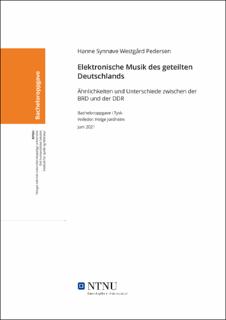| dc.contributor.advisor | Jordheim, Helge | |
| dc.contributor.author | Pedersen, Hanne Synnøve Westgård | |
| dc.date.accessioned | 2022-02-18T18:22:12Z | |
| dc.date.available | 2022-02-18T18:22:12Z | |
| dc.date.issued | 2021 | |
| dc.identifier | no.ntnu:inspera:78672593:44019882 | |
| dc.identifier.uri | https://hdl.handle.net/11250/2980199 | |
| dc.description.abstract | Tyskland er kjent land innenfor den elektroniske musikksjangeren. De begynte å eksperimentere med denne type musikk i en tid da det knapt fantes instrumenter og maskiner for slikt. I tidligere Vesttyskland ble den elektroniske musikken et symbol på noe tysk og artister som Tangerine Dream, Giorgio Moroder og Kraftwerk var populære også i utlandet. I det tidligere Østtyskland vokste det fram et elektronisk miljø noe senere, med bandet Pond som det mest kjente. I begge landene ble det laget elektronisk musikk og musikkmiljøene hadde en del til felles som enkelte typer musikkstiler og aktive undergrundsscener og forskjeller som vestyyskernes mulighet til å synge på hvilket som helst språk, mens østtyskerne kun kunne synge på tysk. Den elektroniske musikken som kom fra denne delte tiden har påvirket den elektroniske sjangeren i ettertid, både innad i landet og utenfor landet. | |
| dc.description.abstract | Germany is a wellknown country in the electronic musik genre. They started experimenting with this type of music in a time where it was barely any type of instruments or machines for this. In the former FRG the electronic music became a symbol of something german and artists like Tangerine Dream, Giorgio Moroder and Kraftwerk were also popular outside the country. In the former GDR the electronic scene developed a bit later, with the band Pond as the most famous. Electronic music were made in both countries and the scenes had a lot in common like certain types of electronic styles and active electronic underground music scenes. They also had differences like the Westgermans possibiliy to sing in whatever language they wanted to, while the Eastgermans were only allowed to sing in German. The electronic music from this time when the country was divided influenced the electronic genre in later times, both in the country itself and outside the country. | |
| dc.language | | |
| dc.publisher | NTNU | |
| dc.title | Elektronische Musik des geteilten Deutschlands: Ähnlichkeiten und Unterschiede zwischen der BRD und der DDR | |
| dc.type | Bachelor thesis | |
